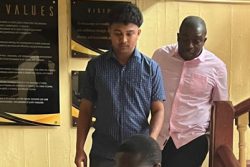Governments the world over that aspire to be responsive and accountable to the people function in a system of checks and balances and respect this. The separation of powers provides the most potent way of limiting excesses. The legislatures of Westminster-style Parliaments make the laws and through their committee systems can wield enormous influence on government policy and illuminate complex issues by the convening of hearings. The judiciary has its inscribed role of weighing matters brought before it on the overreach of the executive. Since 2012, the government, as is its democratic right has tested the boundaries of the separations of the various branches and is clearly intent on continuing to do so.
Aside from the other branches of government there is an array of watchdog bodies that address abuses of the state and its officers. In our context these would include the Office of the Ombudsman and the Integrity Commission and the Police Complaints Authority. None of these three are as equipped as they should be to discharge their important functions. Indeed, the Ombudsman office is just getting back into its stride after being defunct since 2005 and the Integrity body is really a skeleton without a functioning board and clearly incapable of holding any senior official or Member of Parliament accountable. The stagnation in these bodies is a clear sign of the PPP/C government’s disrespect for them and its unwillingness to have its power balanced and moderated in keeping with normative standards.
Then there are the constitutional bodies and commissions which have essential functions and have been brought within the ambit of the constitution and also attain a large degree of financial autonomy. Here again, the government has not been averse to pushing the envelope although when it attempts to defy and ridicule constitutional bodies it is heading down a dangerous path that will ultimately weaken its own hold on authority.
That was exactly the case last week when the Head of the Presidential Secretariat, Dr Luncheon had the temerity to call upon the Guyana Elections Commission to prove that it was ready to hold elections. GECOM’s orbiting in the constitution’s sphere of influence protects it from the meanderings of meddlesome government officials intent on creating diversions. Dr Luncheon’s prating was in response to an exchange of statements between the PPP/C-appointed commissioners, Messrs Mangal, Shaw and Mangar and the Head of GECOM, Dr Surujbally. The PPP/C commissioners were concerned that GECOM was not as prepared for elections as it should be and Dr Surujbally answered their concerns point by point and quite convincingly.
It is GECOM’s enshrined constitutional role to declare its readiness and not in the bailiwick of Dr Luncheon to impute otherwise or seek substantiating evidence. The whole purpose of the reform of the Bollers Commission was to enable transparency and confidence in the electoral system. The reforms were accompanied by a whole raft of other steps including counting of ballots at the place of poll and the developing of a new National Register of Registrants and a voters list. Since 1990, the PPP/C has had full access to the deliberations of GECOM and has happily accepted its diagnoses and prescriptions with nary a protest. Once the Commission has had full internal discussions on electoral preparations and ruled that it is ready, that should be the end of the matter unless there was some patent miscalculation. It should also be noted that this same Commission has presided over two general elections and is therefore clearly in an excellent position to pronounce on readiness to discharge its responsibilities.
Unsurprisingly, the PPP/C’s major noises about GECOM have coincided with the advent of its weakened electoral standing. Even though it won the Presidency at the 2011 elections and accepted it, Parliament was lost to the opposition. President Ramotar then had the gumption to assert that there had been rigging of the elections which prevented his party from gaining an outright majority. In that one statement there was an instant role reversal. It has been the PNC in its varied forms since 1992 which has claimed that there have been electoral shenanigans while the PPP/C, which has won all elections since then, expended much energy in defending the integrity of those results. The turnaround was a further demonstration of the naked and vulgar quest for power at any cost.
Now, the President and his leading officials and those of the ruling party are casting doubts on GECOM’s ability to hold local government elections this year. This is all because of the PPP/Cs patent unwillingness to risk a heavy defeat in Georgetown and other key centres in local government polls. In its spurious grounds for denying these polls, the PPP has become one with the tenebrous reasons that the Hoyte administration advanced for not initially wanting electoral reforms in 1990 and then delaying elections by two years. The turnaround is a cynic’s dream.
Dr Luncheon’s intervention on the matter, as nonsensical as it was, didn’t provide the basis for offence. It was the awful and unfounded excursion into the functioning of a constitutional commission and for the sole purpose of continuing this disgraceful denial of local government elections. It exposed the government’s lack of respect for the role of this constitutional body.
A government such as this one, intent on trespassing on the delineated functions of other branches of government and cavalier in its disposition towards important checks and balances bodies such as the Public Service Appellate Tribunal and the Public Procurement Commission, quickly begins to lose any sense of rectitude. It is then far more vulnerable to the runaway excesses that are evident in governments with unchecked power.








